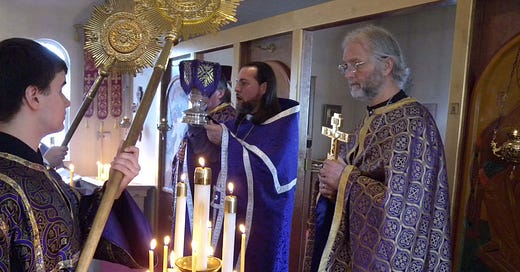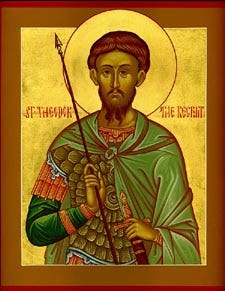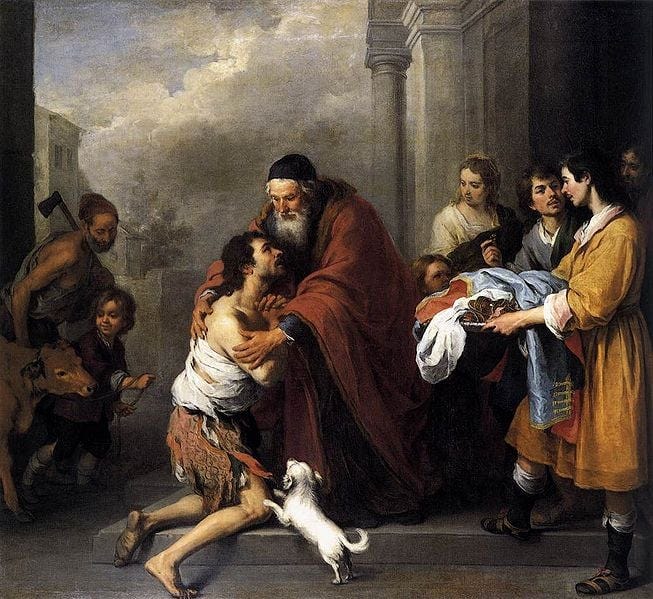1 John 2:18-3:10 (Epistle)
18 Little children, it is the last hour; and as you have heard that the Antichrist is coming, even now many antichrists have come, by which we know that it is the last hour.
19 They went out from us, but they were not of us; for if they had been of us, they would have continued with us; but they went out that they might be made manifest, that none of them were of us.
20 But you have an anointing from the Holy One, and you know all things.
21 I have not written to you because you do not know the truth, but because you know it, and that no lie is of the truth.
22 Who is a liar but he who denies that Jesus is the Christ? He is antichrist who denies the Father and the Son.
23 Whoever denies the Son does not have the Father either; he who acknowledges the Son has the Father also.
24 Therefore let that abide in you which you heard from the beginning. If what you heard from the beginning abides in you, you also will abide in the Son and in the Father.
25 And this is the promise that He has promised us – eternal life.
26 These things I have written to you concerning those who try to deceive you.
27 But the anointing which you have received from Him abides in you, and you do not need that anyone teach you; but as the same anointing teaches you concerning all things, and is true, and is not a lie, and just as it has taught you, you will abide in Him.
28 And now, little children, abide in Him, that when He appears, we may have confidence and not be ashamed before Him at His coming.
29 If you know that He is righteous, you know that everyone who practices righteousness is born of Him.
1 Behold what manner of love the Father has bestowed on us, that we should be called children of God! Therefore the world does not know us, because it did not know Him.
2 Beloved, now we are children of God; and it has not yet been revealed what we shall be, but we know that when He is revealed, we shall be like Him, for we shall see Him as He is.
3 And everyone who has this hope in Him purifies himself, just as He is pure.
4 Whoever commits sin also commits lawlessness, and sin is lawlessness.
5 And you know that He was manifested to take away our sins, and in Him there is no sin.
6 Whoever abides in Him does not sin. Whoever sins has neither seen Him nor known Him.
7 Little children, let no one deceive you. He who practices righteousness is righteous, just as He is righteous.
8 He who sins is of the devil, for the devil has sinned from the beginning. For this purpose the Son of God was manifested, that He might destroy the works of the devil.
9 Whoever has been born of God does not sin, for His seed remains in him; and he cannot sin, because he has been born of God.
10 In this the children of God and the children of the devil are manifest: Whoever does not practice righteousness is not of God, nor is he who does not love his brother.
Mark 11:1-11 (Gospel)
1 Now when they drew near Jerusalem, to Bethphage and Bethany, at the Mount of Olives, He sent two of His disciples;
2 and He said to them, “Go into the village opposite you; and as soon as you have entered it you will find a colt tied, on which no one has sat. Loose it and bring it.
3 And if anyone says to you, ‘Why are you doing this?’ say, ‘The Lord has need of it,’ and immediately he will send it here.”
4 So they went their way, and found the colt tied by the door outside on the street, and they loosed it.
5 But some of those who stood there said to them, “What are you doing, loosing the colt?”
6 And they spoke to them just as Jesus had commanded. So they let them go.
7 Then they brought the colt to Jesus and threw their clothes on it, and He sat on it.
8 And many spread their clothes on the road, and others cut down leafy branches from the trees and spread them on the road.
9 Then those who went before and those who followed cried out, saying: “Hosanna! ‘Blessed is He who comes in the name of the LORD!’
10 Blessed is the kingdom of our father David that comes in the name of the Lord! Hosanna in the highest!”
11 And Jesus went into Jerusalem and into the temple. So when He had looked around at all things, as the hour was already late, He went out to Bethany with the twelve.
Great Martyr Theodore the Tyro (Recruit)
The Holy Great Martyr Theodore the Recruit1 was a soldier in the city of Amáseia in Pontus (Asia Minor) on the coast of the Euxine (Black) Sea, under the command of the Praepositus (regimental commander) Brincus. Saint Theodore was ordered to offer sacrifice to idols, but he proclaimed his faith in Christ the Savior in a loud voice. Brincus gave him a few days to think it over, during which time the Saint prayed.
Theodore was accused of setting a pagan temple on fire and destroying the idol of Rhea, and so he was thrown into prison to be starved to death. The Lord Jesus Christ appeared to him there, comforting and encouraging him. When he was brought before the Governor Publius, Theodore boldly confessed his faith, for which he was subjected to new torments and condemned to be burnt alive. The Great Martyr Theodore mounted an enormous pyre, and after he made the Sign of the Cross, the wood was lit, but the Holy Spirit cooled the flames. Saint Theodore stood in the flames, praising and glorifying God. Then he gave his holy soul into God's hands, and the onlookers saw his soul ascending to Heaven, according to the author of his Life, who was also an eyewitness.
This occurred in about the year 306 under the Roman Emperor Galerius (305-311). Unharmed by the fire, Saint Theodore's body was buried under a widow's house in the city of Eukháϊta, not far from Amáseia. Later, his relics were transferred to Constantinople, to the church which bears his name. His head is in the city of Gaeto, Italy.
Fifty years after the Saint Theodore's martyrdom, Emperor Julian the Apostate (reigned 361-363), planned to commit an outrage upon the Christians during the first week of Great Lent. He ordered the city magistrate of Constantinople to sprinkle all the food in the marketplaces with blood which had been offered to idols. Saint Theodore appeared to Archbishop Eudoxios in a dream, and told him to inform all the Christians that no one should buy anything in the marketplaces, but to eat boiled wheat with honey (kolyva) instead.
In remembrance of this occurrence, the Orthodox Church commemorates the holy Great Martyr Theodore the Recruit each year on the first Saturday of Great Lent. On Friday evening, at the Divine Liturgy of the Presanctified Gifts, after the prayer at the Ambo, the Canon to the Holy Great Martyr Theodore, composed by Saint John of Damascus, is sung. After this, kolyva is blessed and distributed to the faithful. The celebration of the Great Martyr Theodore on the first Saturday of Great Lent was established by Patriarch Nektarios of Constantinople (381-397).
The Troparion to Saint Theodore is very similar to the Troparion for the Prophet Daniel and the Three Holy Youths (on the Sunday Before the Nativity of the Lord). The Kontakion to Saint Theodore, who suffered martyrdom by fire, reminds us that he also had faith as his breastplate (see I Thessalonians 5:8).
In iconography, Saint Theodore the Recruit is depicted in four different ways: either alone in military garb, battling a large snake, or together with Saint Theodore the Commander, standing upright or riding horses. He always wears his military uniform.
We pray to Saint Theodore the Recruit for the recovery of stolen articles.
1 His title comes from the Latin word tiro, because he was a newly-enlisted recruit, not because he came from the city of Tyre, as some misinformed persons imagine.
Penthos: The Lenten Journey to Joy
By Emma Cazabonne; Pemptousia.com
Some of us might think: here we go again, another Lent is on us, and many weeks without our favorite eggs and bacon, all that we like and just can’t live without.
Today, I would like to propose you a more dynamic and positive outlook on Lent. Great Lent is actually an adventure, a fabulous journey. All of us Orthodox Christians are together on this journey, and we have a great companion: the Prodigal Son (Lk 15:11-31).
You heard this parable during the Divine Liturgy a few weeks ago. It speaks volumes on the love of the Father, so much so that some people don’t call it the prodigal son, but the prodigal father!
It also teaches us about ourselves. As the story begins, we know that the prodigal son is none other than our own selves, with our sinfulness and rebellion. During Matins, we pray:
“The divine treasure that once you gave me, Father, I have sinfully wasted. I have departed from You and lived as the Prodigal, O Compassionate Father… But now I return to You and cry with tears: I fall down before Your loving-kindness, accept me now also as I return”.
“The divine treasure that once you gave me…”: with the Prodigal, we acknowledge the goodness of the Father, and we are aware of all the wealth He has given us: our lives, the beauty of nature, our families and friends, and His Salvation.
If we are honest with ourselves, we also have to admit the waste we have made of these treasures. The prodigal son went to a far country, and there spent all that he had. A far country: it is the unique definition of our human condition that we must assume and make ours as we begin our journey. We constantly turn and depart from our Father, we run away from the source of His goodness as if we had somewhere more important to go.
Far from our Father, far from our true Home, we are in exile. There, we are enslaved and we suffer. We are enslaved to a multiplicity of needs, many being roused in us by our consumerism society (just as the prodigal wanted to consume the husks of the pigs). We are torn between all these needs, which keep us at the superficial level, and we suffer, because deep under these needs, we feel the hunger for the only important thing:
“I am wasted with hunger… and in exile from Your presence, O Christ supreme in loving-kindness. Take pity on me as I now return, and save me as I sing the praises of Your love for mankind”.
In exile, enslaved and in pain, we cry with tears, with the prodigal and with the psalmist: “By the rivers of Babylon we sat and wept at the memory of Zion…On the poplars there we had hung up our harps… How could we sing a song on alien soil?” This Psalm 136 was written by a nation in exile, dominated in a foreign land, weeping bitterly for the life which then stood afar off.
So did the prodigal weep from his own exile, pondering on the goodness of his Father’s love.
The whole Lenten journey, from these bitter tears to tears of joy in the company and union of the Father, can become our own journey if we stand in examination of our lives, see how far we have brought ourselves from the life God intends for us, and then deeply long and desire to return to our true home. This is the spirit of penthos, of compunction.
Originally, the term compunction, English for the Greek word penthos, is a medical term, indicating attacks of physical pain (compunctio= cum-pungere, to puncture with). Then it was also used on the spiritual level, to signify pain of the spirit, a suffering due to the actual existence of sin and as a result of our desire for God. It is associated with the notions of conversion and penitence.
That is exactly what the prodigal son experienced.
Gregory of Nyssa has a great definition: “Penthos is a sorrowful disposition of the soul, caused by the privation of something desirable” (that is to say, the privation of salvation.)
Note that this mourning has nothing to do with mere sadness. It is neither sadness nor worldly grief, but a godly grief, a grief caused by the awareness of having fled away from God, and by the desire to return to Him.
John Cassian has 3 important pages on compunction in his 9th conference on prayer. Here is #29,1,2 (p.347): “Compunction arises from the contemplation of eternal goods and the desire for that future glory, for the sake of which, too, abundant fountains of tears erupt out of irrepressible joy and overwhelming happiness. All the while our soul is thirsting for the strong and living God, saying: ‘When shall I come and appear before the face of God? My tears have been my bread by day and by night.’ Daily, with mourning and lamentation, it declares: ‘Woe is me that my sojourning has been prolonged.’ And : ‘Too long has my soul been a sojourner.’”
And in the Philokalia, Evagrios (On Prayer #78) writes: “When you think you do not need tears for your sins during prayer, reflect on this: you should always be in God, and yet you are far from Him. Then you will weep with greater feeling.”
How can we obtain the spirit of compunction? Actually, it is a gift from God! But it requires our cooperation and our preparation. Awareness prepares the conditions for receiving this gift: awareness of our state of sin and of the goodness of God. “The beginning of compunction is to know oneself”, writes Ephrem. It is through self-knowledge that sin itself can finally turn to the good of the sinner, thanks to the compunction which it inspires in us.
This week’s calendar reminders:
Monday 2/17: Matins 8:30 am
Tuesday 2/18: no services or events
Wednesday 2/19: no services or events
Thursday 2/20: Matins 8:30 am; Men’s Group 7 pm
Friday 2/21: Matins 8:30 am
Saturday 2/22: Catechumen Class 4:30 pm; Great Vespers 6 pm
Sunday 2/23: Divine Liturgy 9:15am; Meatfare Sunday; Greg Stevenson Baptism
CLICK BELOW to donate online:
Christ the Savior Orthodox Church is located in Southbury, Connecticut, and is part of the New England Diocese of the Orthodox Church of America.
Mailing address: Christ the Savior Church, 1070 Roxbury Road, Southbury, CT 06488
PLEASE DONATE to help our parish do the work of the Lord, thrive and grow, and extend the Kingdom of God. May the Lord bless your generosity!
Fr. Moses Locke can be reached at frmoseslocke@gmail.com












